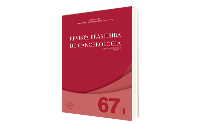Networking in the Oncology Field from the Perspective of Users
DOI:
https://doi.org/10.32635/2176-9745.RBC.2021v67n1.1119Keywords:
Neoplasms, Social Support, Social ConditionsAbstract
Introduction: The diagnosis and treatment of cancer can cause traumatic consequences, both for patients and their families, which can be minimized through social support. Objective: To identify the perceptions of social support of low-income cancer patients. Method: Descriptive qualitative approach study based on conceptual aspects of care, carried out with low-income cancer patients assisted by a group of volunteers from a city in the countryside of Minas Gerais, following the criteria of the Consolidated Criteria for Reporting Qualitative Research. For data collection, semi-structured, recorded interviews were used, and the sample was closed using the theoretical saturation technique. The data were analyzed using inductive thematic analysis. Results: In the data analysis, three thematic units emerged: interpersonal relationships: the support received from an active collaboration network between people; singularized care as source of support for the health network; and religiosity as a way of coping with difficult situations. These themes portray aspects related to the support network that can contribute for the comprehensive care of the cancer patients, with welcoming and acknowledging needs. Conclusion: A solid social support network formed by individuals who play several social roles is perceived as important for better coping with cancer from the perspective of the biopsychosocio-spiritual model.









